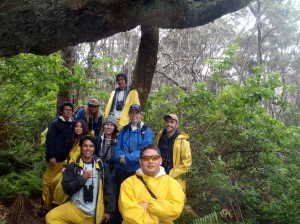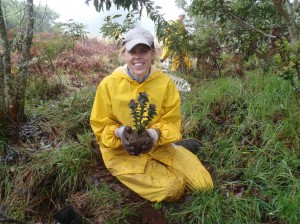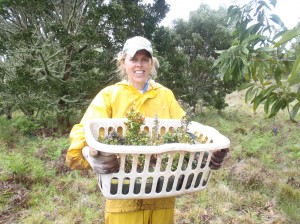Professor at Kapiʻolani Community College, Wendy Kuntz, teaches several classes a semester, including, Biology 101,124, 124 lab and Biology 256 lab, is the 2013 recipient of the Excellence in Teaching Award. Dr. Kuntz shares with us her teaching philosophy, and her love for teaching students science.
Wendy Kuntz: The way the process works (excellence in teaching) is they want to keep it under wraps until graduation. So it was announced at the May graduation ceremonies.
D: What have you done with your award, is it a plaque, is it a…
WK: I have a, it’s actually a medal. This office is relatively new for me. I’m very proud of it actually. Teaching is something dear to my heart, and it’s really wonderful to receive recognition for that. I’m thinking of doing something so I can bring it in. I don’t think I’ll wear it that often (laughs).
D: How long have you been teaching?
WK: I’ve been teaching at KCC since Fall 2007. I did have some informal teaching experience before then, I did my Ph.D at UH Mānoa. During the Ph,D process I was actually a National Science Foundation Fellow through a program called the GK12 Fellowship program, which was I think short for Graduate to K12. It’s a program designed by national science foundation to bridge scientists with teaching, and especially communicating science. I did have some experience before coming to KCC. KCC was my first full time position teaching.
D: Have you always wanted to be a teacher?
WK: Actually, no. I started as a scientist, well, I shouldn’t say that, I did an undergraduate degree in zoology and then ended up working in conservation for a number of years with different conservation organizations, and I decided that I really wanted to study more of the science aspect. I went back to school, got a Master’s then a Ph.D.
I’ve always enjoyed communication science because I find it important that scientists communicate what they’re doing to people who maybe aren’t familiar. I always had that interest, and when that job got announced here at KCC where they were looking for someone to teach introductory non-majors biology, which I love teaching cause I love introducing people to science. I thought maybe it was written for me. I’ve fallen in love with it…it’s something I really enjoy doing.
D: What did you want to do before you became a teacher?
WK: I originally thought I’ll go back to school and become a research scientist. And I still think of myself as a scientist. I get to do research with my students. I have a strong background in research science. And so I think of myself more as a scientist who’s also teaching now, who chose to do full time teaching instead of going towards the research track.
D: If you could send a message to back in time to yourself as a grad student, what would you tell yourself?
WK: Wow, great question. I’m not sure. I think maybe that I have learned that in education, including from doing a Ph.D that persistence and hard work are just as important as native intelligence and you have to really enjoy what you’re doing.
D: Do you have a teaching motto?
WK: I have a teaching philosophy. My philosophy is that everyone can do science, and the way to learn science is to do science. That means getting out in the natural world making observations, discussing their findings with each other and communicating information to the public.
D: How do you deal with difficult students?
WK: I think every student has something to bring to the table and is here because they want to learn. Part of my job is to help them find the way that they learn best.

Ecology Club’s trip to Hakalau Forest National Wildlife Refuge, Big Island during Spring 2013. Photo courtesy: Wendy Kuntz.
D: What’s a common trick that students pull that they think you’re unaware of?
WK: Students are here for themselves, I’m also very biased. I went to one of the last remaining colleges that has an honor code and I expect the same high standards from my students. I kinda feel like if students are cheating, they’re cheating themselves.
I’ve basically designed my tests and assignments to the point where they’re not just asked to regurgitate something from the book, they need to actually do something or discuss it. But for me, I understand that students are making their own choices for their own life. My job is just here to guide them, not to penalize them.
D: What’s one thing that students have done that you love?
WK: One of the things I’ve been so proud of my students for is that they’ve started the Ecology Club here on campus. I’m the faculty adviser for that club but that’s a completely student driven club. They’ve done some amazing projects, (like) organized trips every semester to go to Hakalau. (on the Big Island) They’re just a terrific group of students. I’ve learned a lot from them and I’m very impressed with the work they do.
D: The easiest way to get on your good side?
WK: Be passionate about what you’re doing.
D: What is your teaching philosophy? (Please explain your personal teaching philosophy and describe how it is appropriate for a community college like KCC.)
WK (over email correspondence): My teaching philosophy is that all students can succeed and that my role is to engage students in the process of science and to partner with them to build a foundation for lifelong learning and participation in science. I feel it is critical that all students, both science majors and non-science majors are introduced to science as a process, preferably early in their academic careers. I view my students as future scientists, leaders, community members, and citizens. No matter what their path in life, I want them to embark on a lifetime of independent thinking and take with them the thrill of scientific discovery, a wonder about the natural world, and an understanding of how science progresses. I believe deeply in the concept that students learn science best by doing science and so I have endeavored to incorporate undergraduate research into my laboratory courses and to mentor independent research students.
I have also adopted place-based learning to engage students. This pedagogy is rooted in the idea that students learn best by working with their community to solve problems or by conducting research in their local environments. Hawaii’s isolation has resulted in a unique biological evolutionary history, but Hawaii also faces so many of the most pressing ecological issues of the 21st century and so there are many opportunities for students to learn through real-world local issues. It also means that students can give back to their communities and I have incorporated service into my courses and established active community partnerships with The Nature Conservancy and Malama Maunalua as part of my Biol 124 Lab. Through these community partnerships I have learned that “Ma ka hana ka ‘ike” (knowledge is gained by doing) is strongly rooted in the Hawaiian culture and I have found that place-based education is a way to engage students from all backgrounds in science.
About Professor Wendy Kuntz.
Degree: Ph.D in zoology, program in ecology, evolution and conservation biology.
Hobbies: Birding, Hiking, going to the beach, spending time with her husband, family, and dog.


